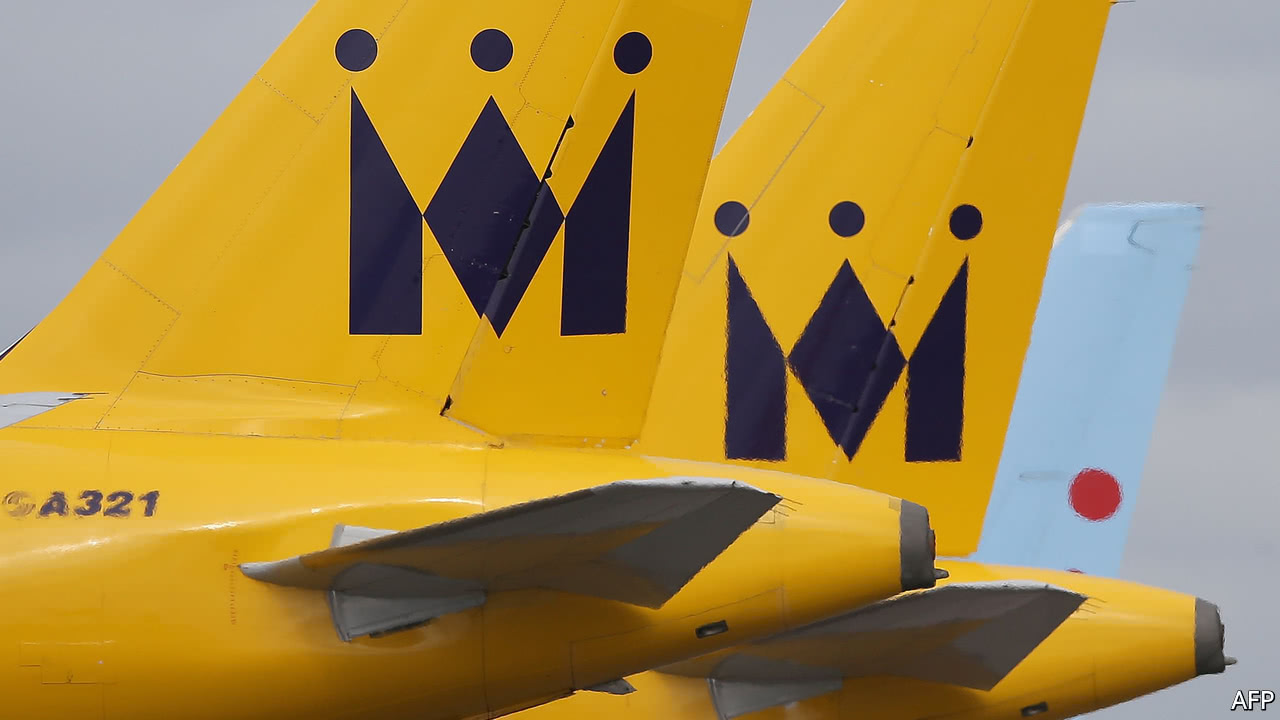
JUST before dawn on October 2nd, passengers booked to fly on Monarch Airlines began to receive texts informing them that their flights had been cancelled. This was the first news that Britain’s fifth-biggest airline had ceased trading and is now in administration.
It is the country’s biggest airline ever to collapse. Monarch had been in last-ditch talks with the Civil Aviation Authority, a regulator, to renew its licence to sell package holidays, but failed to reach a deal. About 110,000 passengers have been left stranded, although the government has hired over 30 planes, in effect creating another airline, to bring holiday-makers back over the next two weeks. Chris Grayling, the transport secretary, is calling it the “biggest ever peacetime repatriation”. A further 860,000 have lost future bookings, and with it weddings, vacations and more, although many should be able to reclaim some of their costs. Monarch also employs about 2,100 people, all now looking for new jobs.
-
How bike-sharing works
-
Monarch Airlines goes into administration
-
China is turning against cryptocurrencies
-
The Tory conference reflects the dismal state of the party
-
At least 58 people are killed and 515 injured in a shooting in Las Vegas
-
A Nobel prize for medicine for the understanding of body clocks
Monarch was a quintessentially British brand. It was created in 1967 by the owners of the Cosmos, a travel agency, specifically to cater to the new and rapidly expanding package-holiday market. Monarch’s first charter flight took off the following year from Luton airport, where the company was headquartered, for Spain. And that was the story for the next three very successful decades—flying sun-seeking Britons to Mediterranean resorts for cheap, all-inclusive holidays.
However, that business model came under severe strain in the early 2000s with the arrival of the internet. Punters could now choose and book their own holidays much more easily. And the rise of low-cost airlines such as easyJet, founded in 1995 and also based at Luton, gave travellers new alternatives to charter flights. Passenger numbers on non-scheduled (charter) flights operated by British airlines fell by two-thirds from 2001 to 2016, even as the overall number of flights increased dramatically, according to the CAPA Centre for Aviation. Low-cost airlines were the main beneficiaries.
As profits declined, so Monarch took the decision to get out of the charter market and concentrate on short-haul flights. But, as Robyn Byde, an analyst at Cantor Fitzgerald, points out, the European market is fiercely competitive and increasingly dominated by just four big players: Ryanair, easyJet, the Lufthansa group and IAG (a group which includes British Airways, Aer Lingus and Iberia). Monarch airlines was not big enough, and thus did not have the purchasing power, to survive in this market argues Mr Byde. The same is true of Air Berlin and Alitalia which also went bankrupt this year. This over-capacity in the European market will probably lead to yet more consolidation in the years to come.
Andrew Swaffield, the boss of Monarch, also blamed terrorism and Brexit. Monarch had a healthy business flying to Egypt and Tunisia, but these markets fell away after attacks on other airlines and tourist resorts. The number of passengers flying from Britain to North Africa in August declined from 177,000 in 2016 to 95,000 this year. Moreover, the fall in the value of the pound, provoked by Brexit, compounded the airline’s woes, as many of its costs, such as aviation fuel, were priced in dollars. To escape its predicament, the airline recently made a bid to “pivot” out of the loss-making short-haul market into long-haul, announcing an order for 15 more Boeing 737 MAX 8s, worth $1.7bn in June. But by then it was too late and the company could not find a buyer for its short-haul operation. A wretched end on the company’s 50th anniversary.
Source: economist
Monarch Airlines goes into administration